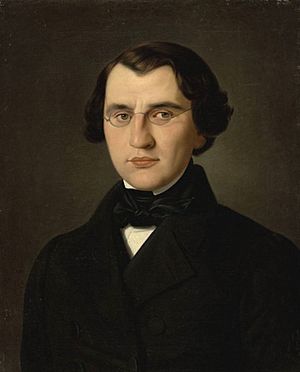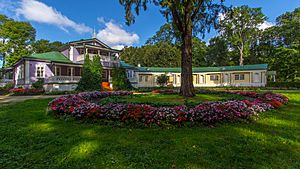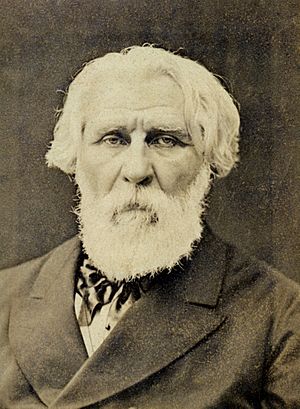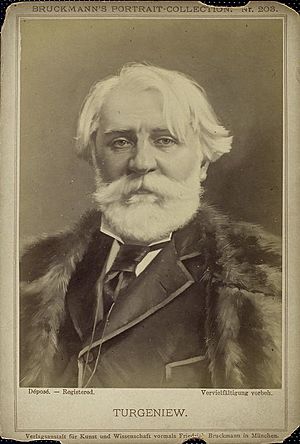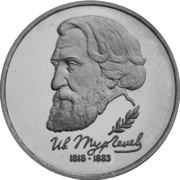Ivan Turgenev facts for kids
Quick facts for kids
Ivan Turgenev
Ива́н Турге́нев |
|
|---|---|
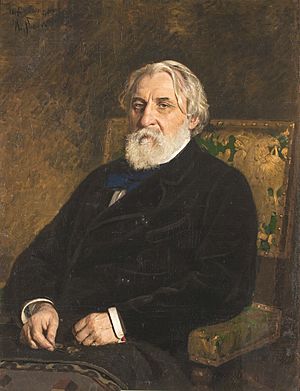
Turgenev, in 1874
|
|
| Born | Ivan Sergeyevich Turgenev 9 November 1818 Oryol, Oryol Governorate, Russian Empire |
| Died | 3 September 1883 (aged 64) Bougival, Seine-et-Oise, France |
| Occupation | Writer, poet, translator |
| Genre | Novel, play, short story |
| Literary movement | Realism |
| Notable works |
|
| Children | 1 |
| Signature | |
 |
|
Ivan Sergeyevich Turgenev (born November 9, 1818 – died September 3, 1883) was a famous Russian writer. He wrote novels, short stories, poems, and plays. Turgenev also helped introduce Russian literature to people in Western countries.
His first important book was a collection of short stories called A Sportsman's Sketches (1852). This book was a big step for realism in Russian writing. His novel Fathers and Sons (1862) is seen as one of the most important books of the 1800s.
Contents
Ivan Turgenev's Early Life
Ivan Sergeyevich Turgenev was born in Oryol, Russia. His parents, Sergei Nikolaevich Turgenev and Varvara Petrovna Turgeneva, were from noble Russian families. His father was a cavalry colonel who fought in the 1812 war against France. Ivan's mother came from a very rich family.
Ivan and his two brothers, Nikolai and Sergei, were raised by their mother. She was an educated but strict woman. They lived at the family estate called Spasskoye-Lutovinovo. Ivan's mother later inspired a character in his story Mumu. The children had foreign teachers and learned to speak French, German, and English fluently. The family often spoke French at home.
Ivan's father spent little time with the family. This made Ivan sad, and he wrote about their relationship in his novel First Love. When Ivan was four, his family traveled through Germany and France. In 1827, they moved to Moscow so the children could get a good education.
Ivan Turgenev's Education
After finishing school, Turgenev studied at the University of Moscow for one year. From 1834 to 1837, he studied Classics, Russian literature, and philology at the University of Saint Petersburg. During this time, his father and younger brother died.
From 1838 to 1841, he studied philosophy and history at the University of Berlin in Germany. He was very impressed by German society. When he returned to Russia, he believed that Russia could improve by adopting ideas from the Age of Enlightenment. Like many educated people of his time, he was against serfdom, a system where peasants were tied to the land.
In 1841, Turgenev began working for the Russian government. He worked for the Ministry of Interior for two years.
Ivan Turgenev's Writing Career
When Turgenev was young, a family serf read him poems. His first writings, poems and sketches, showed great talent. A leading Russian literary critic, Vissarion Belinsky, praised his early work. Later in his life, Turgenev spent most of his time outside Russia. He lived in Baden-Baden or Paris, often near the family of the famous opera singer Pauline Viardot. He had a close, lifelong friendship with her.
Turgenev never married. He was a tall and strong man, but he was also shy and quiet. When he was 19, he was on a steamboat in Germany that caught fire. Some rumors, spread by his enemies, said he acted like a coward. He denied this, but the rumors followed him throughout his career. This event became the basis for his story "A Fire at Sea".
His closest writer friend was Gustave Flaubert. They shared similar ideas about society and art. Both of them did not like extreme political views. They also had a somewhat sad but fair view of the world. Turgenev's relationships with Leo Tolstoy and Fyodor Dostoyevsky were often difficult. Tolstoy and Dostoyevsky sometimes felt that Turgenev preferred Western Europe too much.
Unlike Tolstoy and Dostoyevsky, Turgenev's writings did not focus on religious ideas. He was considered an agnostic, meaning he believed it was impossible to know if God exists. Tolstoy and Dostoyevsky sometimes disagreed with Turgenev's views. In 1861, Tolstoy even challenged Turgenev to a duel, but later apologized. They did not speak for 17 years, but their families remained connected.
Dostoyevsky made fun of Turgenev in his novel The Devils (1872). He created a character named Karmazinov, a vain writer who tries to impress young radicals. However, in 1880, Dostoyevsky gave a famous speech about Alexander Pushkin. This speech helped Turgenev and Dostoyevsky become friends again. Turgenev, like many in the audience, was deeply moved by Dostoyevsky's words.
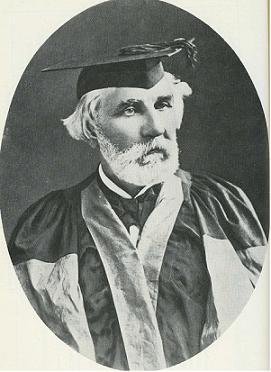
Turgenev sometimes visited England. In 1879, the University of Oxford gave him an honorary degree. This was a special award for his achievements.
Turgenev's health got worse in his later years. In 1883, doctors removed a cancerous tumor. But the cancer had spread, causing him great pain. On September 3, 1883, Turgenev died near Paris. His body was brought back to Russia and buried in St. Petersburg. On his deathbed, he asked Tolstoy to return to writing. After this, Tolstoy wrote important works like The Death of Ivan Ilyich.
Ivan Turgenev's Major Works
Turgenev became famous with A Sportsman's Sketches (1852). This book is a collection of short stories. They are based on his observations of peasant life and nature while he was hunting. The book is believed to have helped change public opinion. It encouraged the abolition of serfdom in 1861, which freed the serfs. Turgenev thought this book was his most important work. Many people, including Leo Tolstoy, agreed.
In 1852, Turgenev wrote an obituary for Nikolai Gogol, another great Russian writer. A government censor in St. Petersburg did not allow it to be published. But a Moscow censor did. The St. Petersburg censor was fired, and Turgenev was blamed. He was put in prison for a month and then sent away to his country estate for almost two years. During this time, he wrote his short story Mumu (1854). Like A Sportsman's Sketches, this story showed the harshness of serfdom.
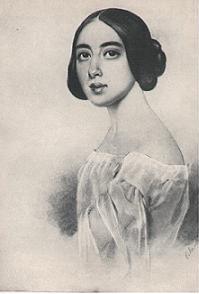
In the early 1850s, Turgenev wrote several novellas (short novels). These included The Diary of a Superfluous Man and Faust. These stories showed the worries and hopes of Russians of his time.
During the rule of Tsar Nicholas I, Russia's political situation was difficult for writers. Many writers and thinkers left Russia for Europe. Turgenev moved to Western Europe in 1854. This decision was likely influenced by his friendship with Pauline Viardot.
In the following years, he wrote the novel Rudin. It tells the story of a man in his thirties who cannot use his talents in Russia. Rudin also shows a longing for the idealistic student groups of the 1840s.
Turgenev changed his writing style from Romantic to more realistic. He was influenced by the critic Vissarion Belinsky, who supported realism in literature. Between 1853 and 1862, Turgenev wrote some of his best stories and his first four novels:
- Rudin (1856)
- A Nest of the Gentry (1859)
- On the Eve (1860)
- Fathers and Sons (1862)
These works often explored themes like first love, dreams that don't come true, and difficult relationships. His experiences with Pauline Viardot and his strict mother greatly influenced these stories.
In 1858, Turgenev wrote A Nest of the Gentry. This novel also showed a longing for the past and a love for the Russian countryside. It features one of his most memorable female characters, Liza.
When Alexander II became Tsar in 1855, the political situation in Russia became more open. In 1859, Turgenev wrote On the Eve. This novel featured a Bulgarian revolutionary character named Insarov.
The next year, he published First Love. This novella was based on his own childhood memories. He also gave a speech called "Hamlet and Don Quixote". In this speech, he described people as being torn between the doubt of Hamlet and the idealism of Don Quixote. This idea can be seen throughout Turgenev's own works.
Fathers and Sons, Turgenev's most famous novel, came out in 1862. Its main character, Eugene Bazarov, was seen as a new type of person in the 1860s. The novel explored the conflict between the older generation, who resisted change, and the younger generation, who had radical ideas. Bazarov is a classic example of a nihilist from the mid-1800s. The book was set during a time of big social change in Russia.
The strong reactions to Fathers and Sons led Turgenev to leave Russia. He also lost many of his readers. Many critics at the time did not take the novel seriously. After this, Turgenev felt disappointed and wrote less.
Turgenev's next novel, Smoke, was published in 1867. It was also not well-received in Russia. It also caused an argument with Dostoyevsky.
His last major work about Russian society was Virgin Soil, published in 1877. He also wrote more personal stories like Torrents of Spring and The Song of Triumphant Love. Other late works included Poems in Prose.
Turgenev wrote about similar topics as Tolstoy and Dostoyevsky. However, he did not focus on the religious and moral ideas that his two great friends did. Turgenev was more like his friends Gustave Flaubert and Theodor Storm. They also often wrote about memories and the beauty of nature.
Ivan Turgenev's Legacy
Turgenev's clear and artistic writing style made him a favorite of later novelists. Writers like Henry James and Joseph Conrad greatly preferred Turgenev's work to that of Tolstoy and Dostoyevsky.
See also
 In Spanish: Iván Turguénev para niños
In Spanish: Iván Turguénev para niños
- Alexander Dmitriyevich Kastalsky who composed an opera based on the novella Klara Milich
- Sir Frederick Ashton, who created a ballet based on A Month in the Country in 1976
- Asteroid 3323 Turgenev, named after the writer
- Lee Hoiby, an American composer and his opera based on A Month in the Country
- Vladimir Rebikov, who composed an opera based on Home of the Gentry in 1916
- Galina Ulanova, who advised her pupils to read such stories of Turgenev's as "Asya" or Torrents of Spring when preparing to dance Giselle
 | James B. Knighten |
 | Azellia White |
 | Willa Brown |


